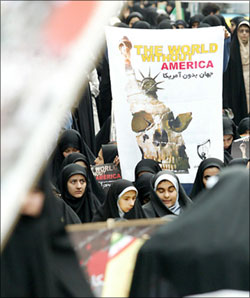
They are still proud of their wonderful act of hostage-taking:
In November 1979, the newly-established Islamic Republic was barely seven months old.
The deposed Iranian tyrant, Mohammad Reza, was a high-profile wanderer, Mahdi Bazargan interim government had failed in establishing country-wide order, and the political and social atmospheres were dense and vulnerable.
Anti-revolutionary figures, trends, and organizations were doing their utmost to dislodge the revolutionary gov't and to render the sacrifices the nation had made, fruitless. Coups were in the making, and all these facts contributed to destabilize the country.
The Carter Administration's rather naive decision to accept the ex-Shah and to ignore all popular and formal Iranian demands for his extradition, plus its covert and overt aids and support for elements who were trying in vain to topple the popular Islamic Republic, added fuel to the flames of hatred for America already kindled.
A group of university students - who later introduced themselves as Muslim Students Following the Line of Imam Khomeini - ultimately decided to seize the embassy of America to protest the irresponsible and arrogant stance towards the plights of the Iranian nation.
It was only after the embassy's takeover that the nation found out the true nature of American under-cover activities at the diplomatic' premises.
Occupying a foreign embassy may be considered to be a rejected act, both according to international law and in inter-governmental relations. Nevertheless, diplomatic corps and premises have an internationally accepted definition. Sophisticated communications and eavesdropping apparatus, as well as classified documents suggested, the embassy was actually what the Iranian people have ever since named it: an espionage den.
The documents-30 volumes plus of which have been published-all bear witness to the sustained interventionist (foreign) policy of consecutive American administrations; to the perpetual tendency in American statesmen to create and dispose foreign governments according to their desires and interests.
The takeover marked a turning point in the relations of third world countries with America, contributing greatly to promoting awareness of nations, and exposing the true face of American diplomacy. Ever since then, nations - and even governments - have moved in cautious steps in expanding their relations with Washington.
Imam Khomeini's affirmation of the brave student action was in fact a stance serving multiple purposes: to promote national and Islamic self confidence and self-esteem, to strengthen the position and status of the oppressed against the hegemony of the great powers, and to underline the fact that for international relations to be lasting and concrete, they have to be based on equality, sincerity, and mutual respect.
 They are still proud of their wonderful act of hostage-taking:
They are still proud of their wonderful act of hostage-taking:
No comments:
Post a Comment